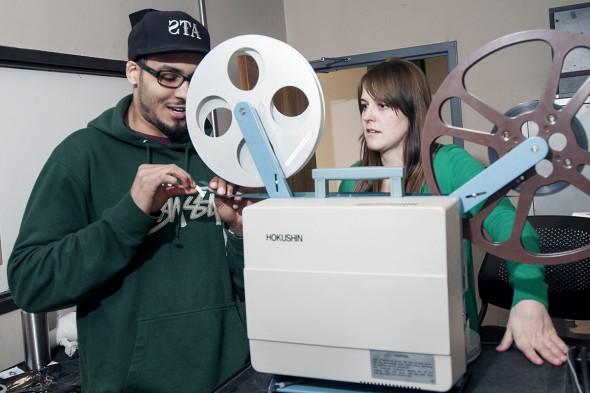Teacher, moviemaker finds direction in film studies

“I started doing film studies as an easy class, and it totally pulled me in a different direction,” says Lori Felker. Photo: Joshua Clark/UIC Photo Services
Since 1966, the Silver Circle Award has been presented to some of UIC’s best teachers. Winners, who are honored at their college commencements, receive $500 and their names join a long list of distinguished colleagues. But what makes the award especially meaningful is its selection committee: the graduating seniors.
Lori Felker’s students range from those learning basic film technology to advanced students who want to talk theory.
“In the arts, it can be all over the place. Some students are shy and don’t participate, others want to direct,” says Felker, visiting assistant professor of moving image in the College of Architecture, Design, and the Arts.
“I’ve been told I have a good ability to address lots of different students’ needs and engage everybody.”
She credits her varied background for that. She studied literature and medieval studies at Indiana University of Pennsylvania, Notre Dame and Oxford, and German film history in Berlin.
“I started doing film studies as an easy class, and it totally pulled me in a different direction,” she says.
She returned to western Pennsylvania, took night classes at Pittsburgh Filmmakers and began freelancing on feature films and commercials. “I liked production organizations and being on sets. Then I’d go home and make an experimental, hand-processed Super 8 film. So I was in both worlds at the same time.”
To combine concepts in film, video and television, she is teaching the themes of transmission and collaboration. “In the moving image world, classes are very separated between film and video,” she says. “I’ve been talking about the signal and light — this transmission of energy and information to record something, to communicate.”
Communication is a prominent theme in her films, some of which can be viewed online. Her current project is a “sort of documentary” on New York musician Von Lmo, “a slippery guy who doesn’t always tell the same story.”
“A documentary represents reality, but I’m doing this on someone who doesn’t live in reality, or believe in truth or time,” she laughs. “That’s changing the way I put it together.”
Felker sometimes shows her films in class because she can answer questions about the process and tools behind them. “If a student says, ‘How do I edit my video?,’ I can open that up to editing in general: why are we making a cut here? Why make anything? What do you need to say?
“It sounds corny, but it can be about life itself.”
